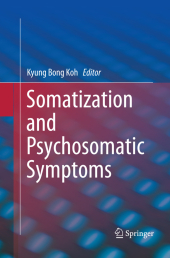 Neuerscheinungen 2015Stand: 2020-02-01 |
Schnellsuche
ISBN/Stichwort/Autor
|
Herderstraße 10
10625 Berlin
Tel.: 030 315 714 16
Fax 030 315 714 14
info@buchspektrum.de |

Kyung Bong Koh
Somatization and Psychosomatic Symptoms
Herausgegeben von Koh, Kyung Bong
2013. 2015. xiv, 323 S. 29 SW-Abb. 235 mm
Verlag/Jahr: SPRINGER, BERLIN; SPRINGER NEW YORK; SPRINGER 2015
ISBN: 1-489-99129-8 (1489991298)
Neue ISBN: 978-1-489-99129-4 (9781489991294)
Preis und Lieferzeit: Bitte klicken
This book covers not only the assessment and treatment of chronic physical complaints but also explores the mechanisms that underlie them. It examines such symptoms and disorders as stress-induced cardiomyopathy, post-stroke depression and fibromyalgic pain.
This book, with contributions emanating from the 21st World Congress of Psychosomatic Medicine held in Seoul in August 2011, presents the latest evidence-based information about the mechanisms, assessment, and management of psychosomatic disorders from a biopsychosociocultural perspective. Somatization is a process characterized by excessive or inappropriate focus on physical symptoms that are medically unexplained. It is highly prevalent in primary care medicine, as somatoform (psychosomatic) disorders tend to be chronic and can cause significant personal suffering and social problems as well as financial burden._ _
Part I Basic Understanding for Somatization.-Chapter 1 Identity of Somatoform Disorders: Comparison with Depressive Disorders and Anxiety Disorders.- Part II Theoretical Approaches to Mind and Body.-Chapter 2 Toward a Philosophy of Life to Underpin Personhood in Medicine.- Part III Biopsychosociocultural Mechanisms in Psychosomatic Medicine.-Chapter 3 Genes, Memes, Culture, and Psychosomatic Medicine: An Integrative Model.-Chapter 4 Alexithymia and Somatic Symptoms.-Chapter 5 Culture and Somatic Symptoms: Hwa-byung , A Culture-Related Anger Syndrome.- Chapter 6 Molecular Mechanism of Sleep-Wake Regulation: from Basic to Translational Research.- Part IV Practical Approaches to Patients and Family.-Chapter 7 Psychosomatic Approach to Clinical Practice.-Chapter 8 Emotional Intelligence, Alexithymia and the Doctor-Patient Relationship.-Chapter 9 Effective Approach to Somatization Assessment and Management.-Chapter 10 Role of Complementary and Alternative Medicine in Psychosomatic Medicine.-Chapter 11 Family Assessment and Intervention for Physicians.- Part V Specific Psychosomatic Symptoms.-Chapter 12 Pain, Depression and Anxiety: a Common Language of Human Suffering.-Chapter 13 Psychosomatic Aspects of Fibromyalgia.-Chapter 14 A Psychosomatic Approach to the Treatment of the Difficult Chronic Pain Patient.- Part VI Specific Psychosomatic Disorders.-Chapter 15 Stress-Induced Cardiomyopathy: Mechanism and Clinical Aspects.-Chapter 16 Poststroke Depression: Mechanisms and Management.-Chapter 17 Cancer in a Psychosomatic Perspective.-Chapter 18 Psychosocial Aspects of Breast Cancer: Focus on Interventions.- Part VII Specific Therapeutic Interventions and Biological Effects of Interventions.-Chapter 19. Motivational Interviewing in Psychosomatic Medicine.-Chapter 20 Wisdom and Wisdom Psychotherapy in Coping with Stress.-Chapter 21 Current Advances in the Psychopharmacology of Psychosomatic Medicine.-Chapter 22 Emotion, Interventions and Immunity.
From the reviews:
"This comprehensive, well-organized book covers a broad range of topics that may be used to develop an effective biopsychosocial approach to patient-centered care. ... Clinicians in any area of medicine would gain insight from reading this book because of the ubiquitous presence of somatic symptoms. Particularly, primary care providers and mental health care clinicians would benefit from the comprehensive nature of this book especially in caring for their difficult to treat patients." (Sheila Lahijani, Doody´s Book Reviews, January, 2014)


